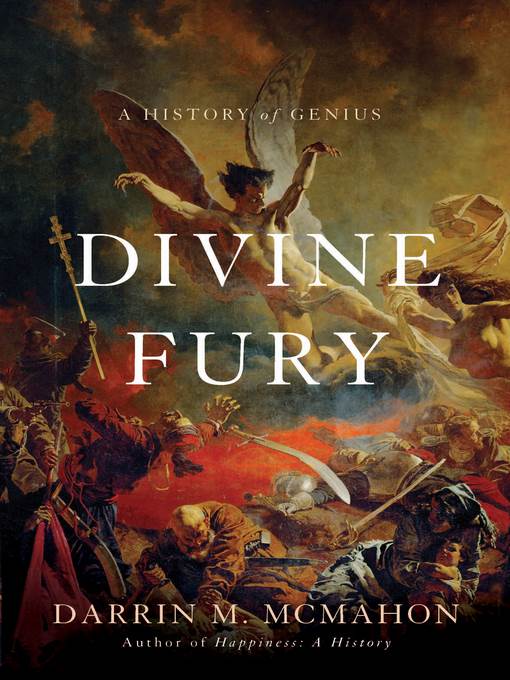
Divine Fury
A History of Genius
کتاب های مرتبط
- اطلاعات
- نقد و بررسی
- دیدگاه کاربران
نقد و بررسی

August 5, 2013
McMahon (Happiness: A History) delivers a comprehensive look at the concept of genius in all its philosophical glory. He takes readers from Socrates to Enlightenment figures like Isaac Newton and on to Oscar Wilde, noting how the ancient Greeks conceived of genius as the daimonion (the root of our modern “demon”) that inhabited a body, whereas the 19th-century Romantics’ notion of genius privileged originality. He goes on to show that our contemporary idea of genius is based on celebrity. McMahon touches briefly on the usual names—Mozart, Shelley, Einstein, and Lenin—and he also addresses the inherent dangers of genius, from Dr. Frankenstein to Adolf Hitler. He ends with a look at the medical and religious implications of the idea, from the development of IQ tests to the perception that geniuses pose potential dangers to the social order. Throughout its history, genius has been attributed mostly to white European males, and this account admittedly reflects that. Covering topics from science to the arts to philosophy, the book offers a densely packed, earnest look at how genius has been viewed throughout the centuries. It’s clear that McMahon knows his topic; it’s less clear that we are any better off for having geniuses among us. Agent: Tina Bennett, William Morris Endeavor.

September 15, 2013
McMahon (History/Florida State Univ.; Happiness: A History, 2006, etc.) examines the varied meanings attributed to the word "genius." Once upon a time, the author freely admits, his approach "might have been glibly dismissed as old-fashioned or methodologically suspect." Perhaps he should have wondered why. It is not simply a matter of the long-running debate as to whether genius is borne or made, but also how far other meanings referencing different times, contexts and peoples can be enfolded into usages now employed. "Even today," he writes, "more than 2,000 years after its first recorded use by the Roman author Plautus, it continues to resonate with power and allure." As the author notes, Hitler presented himself as a genius, and his flatterers and sycophants--e.g., his propaganda chief Goebbels--agreed. Albert Einstein was certainly a scientific genius. McMahon proposes that the moral and political differences that separate the two can be included as attributes of "genius." The author's method includes stretching the current meaning of the word "genius" to include the quality that the ancients Greeks associated with Socrates: his daimon (demon). With great detail and useful scholarship, McMahon uses the word "genius" to assimilate the different qualities of these meanings under a common heading. In the process, the author presents intriguing information--e.g., regarding the 19th-century origins of race science and eugenics and the application of eugenics in both the early days of the Soviet Union and under Hitler. However, his attempt to use what has become such a conflicted, and debased, vehicle to organize the material is a bit disjointed. After all, the word "genius" can now reference sports figures, musicians and nearly anyone somewhat exceptional in their field. An uneven but wide-ranging and intermittently illuminating survey.
COPYRIGHT(2013) Kirkus Reviews, ALL RIGHTS RESERVED.

November 15, 2013
There have been many studies of the idea of genius, but a signal virtue of this new account is its comprehensiveness. Rather than start in the 18th century, when the modern idea of genius emerged--as an exceptional quality located not in God but in man--or with the 19th-century Romantic poets' exaltation of genius as a kind of "divine fury," McMahon (history, Florida State Univ.; Happiness: A History) begins with the ancients, contrasting the Roman notion of ingenium with varied interpretations of genius in modern times. Crucial to the change in meaning of the term was "the waning of mimetic aesthetics," the idea that art was imitation rather than creation. Uniqueness and creativity became the hallmarks of genius from the 18th century on: "The man of genius has a way of seeing, of feeling, of thinking," wrote Diderot, "unique to him alone." McMahon concludes by examining the not always happy fate of the idea in our times. VERDICT This exceptional intellectual history is too densely written to appeal to the casual reader, but it's a gem of a book to be widely read by scholars in many fields, not just in the history of ideas.--David Keymer, Modesto, CA
Copyright 2013 Library Journal, LLC Used with permission.

Starred review from October 1, 2013
The word genius used to be reserved for exceptional individuals on the order of Albert Einstein but is now used so casually that we may all have our 15 minutes of genius, according to McMahon. He traces the origins of the concept of genius to religious notions about the intermediation between individuals and God, with angels and demons seen as the source of genius delivered from on highor low. With the Reformation came new perspectives on nature versus nurture, and the culture of genius emerged as part of a reaction to a broader concept that God and angels are not directing every minute of human life. Ever since Socrates, philosophy, religion, and psychology have debated the source of genius, the timeless struggle to determine where the divine leaves off and the human begins. McMahon details scores of geniuses among poets, artists, philosophers, military strategists, scientists, industrialists, and tyrants as the concept of genius has been democratized. He raises important questions about the nature of genius and whether geniuses can and should be identified and lauded beyond the rest. A sweeping, completely engaging look at a subject that has fascinated humans through the ages.(Reprinted with permission of Booklist, copyright 2013, American Library Association.)

























دیدگاه کاربران